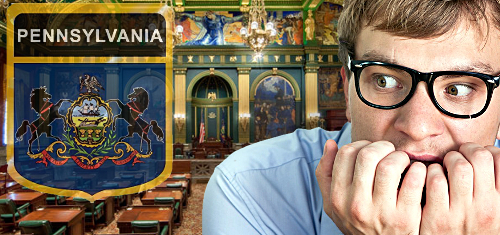 Pennsylvania’s House of Representatives has approved online gambling and daily fantasy sports legislation, setting up a nail-biter in the state Senate.
Pennsylvania’s House of Representatives has approved online gambling and daily fantasy sports legislation, setting up a nail-biter in the state Senate.
On Tuesday, Pennsylvania’s House voted 114-85 in favor of the HB 2150 legislation they initially rejected last week when it contained a controversial video gaming terminals (VGT) component, then gave initial approval to the same legislation with the VGT component stripped out.
The amended HB 2150 approved by the House on Tuesday would allow Pennsylvania’s dozen brick-and-mortar casino operators to partner with approved online gambling technology providers to offer online casino and poker games to state residents.
Casinos looking to go online will pay an $8m upfront fee for a five-year license, with renewals costing $250k. The online technology partners of these casinos will have to pay $2m upfront, with renewal fees of $100k in five years’ time.
Online operators will be taxed at 16% of online revenue, with 14% going to the state and 2% earmarked for economic development projects.
The bill also authorizes slots and mobile gambling at six state airports, for which would-be slots operators will pay a one-time fee of $1m and $100k for license renewals for the smaller airports. Operators looking to stake out a position at the Philadelphia airport will be charged $5m, while Pittsburgh’s airport can be yours for a mere $2.5 million.
In what will be a major disappointment for online licensees, mobile gambling will only be accessible at the airports. Airport mobile gambling rights will cost $1m per airport and mobile revenue will face a 34% tax plus a further 20% that will go to pay for things like extra security and extra-loud beepers for those golf carts.
To date, only Nevada, New Jersey and Delaware have approved online gambling legislation, and Nevada has so far approved only online poker. Pennsylvania’s legislation allows for “wagers placed with out-of-state interactive gaming operators authorized under a reciprocal agreement.”
The legislation also authorizes DFS operators to acquire state licenses in exchange for paying 5% tax on fantasy revenue derived from state residents. Five-year DFS licenses would cost $50k or 7.5% of an operator’s adjusted revenues in the previous calendar year, unless you’re a casino operator, in which case you pay the full $50k.
Finally, the bill okays slots at off-track betting (OTB) parlors and sports betting, although the latter is dependent on Congress repealing the federal ban on sports wagering.
ALL EYES ON SENATE
It remains to be seen whether the Senate will be eager to follow the House into this brave new digital gambling world. If they do approve companion legislation, it will leave only Gov. Tom Wolf’s signature for Pennsylvania to become the fourth US state to offer regulated online gambling.
Gov. Wolf is said to be no great fan of online gambling but has sent out signals that he’s open to the idea if it helps close the state’s budget gap. Pennsylvania is desperately trying to pass a $31.6b budget proposal before the state’s new fiscal year begins on Friday.
Las Vegas Sands boss Sheldon Adelson is an avowed foe of online gambling and Mark Juliano, CEO of the Sands Bethlehem casino in Pennsylvania, has already gone on record saying he hopes the Senate rejects the House’s proposal.
However, Juliano qualified Sands’ opposition by telling The Morning Call his main objection was to the OTB slots item, a plan Juliano said would unduly cannibalize traditional casino revenue. Juliano said Sands remained “fundamentally opposed to online gaming” but said it would “probably not” deter the company from investing further in its Pennsylvania operation.





